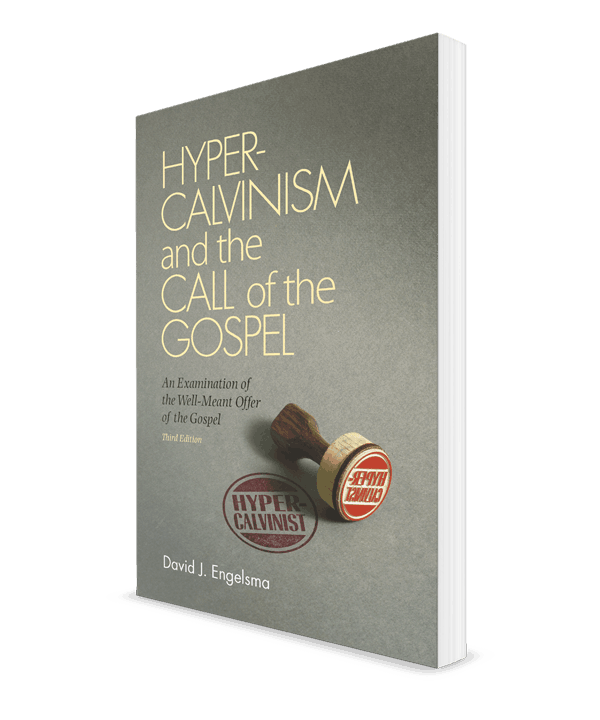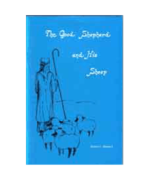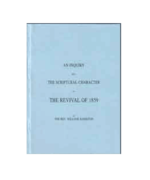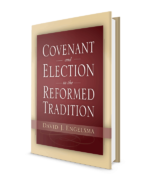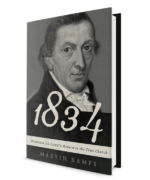This book ably sets forth and defends the Reformed doctrine of the call of the gospel against the hyper-Calvinistic restriction of the call on the one hand, and the Arminian universalizing of grace in a well-meant offer, on the other hand. This issue is very much alive in Calvinistic circles today.
Professor Engelsma examines Scripture, the Reformation confessions and the Reformed tradition, including John Calvin, Francis Turretin, Simon Van Velzen, Abraham Kuyper and Herman Hoeksema.
Dr. John H. Gerstner: “This is certainly an interesting, informative, lively, learned discussion of the essence of the gospel call to all mankind. In my opinion, Professor Engelsma carefully defines and convincingly avoids ‘hyper-Calvinism’ himself and clears his denomination, the Protestant Reformed Churches [PRC], of so teaching … Herman Hoeksema, the Protestant Reformed denomination, and our author David Engelsma in this book emphatically reject the ‘well-meant offer’ as including God’s desire and intention to save reprobates. As a Calvinist … I feel it absolutely necessary to hold with [the PRC] here where she stands, almost alone today, and suffers massive vituperation and ridicule from Calvinists (no less), for her faithfulness at this point to the gospel of God” (from the “Foreword”).
“Here is a clear statement from one of the most vigorous Reformed communities in North America. No serious study of the matter can avoid considering the Protestant Reformed perspective on the issue” (Christian Observer).
“This book is an opportunity to listen to a committed five-point Calvinist speaking to other five-point Calvinists about what he considers to be an extreme form of Calvinism on the one hand, and the free-will positions of Arminians, on the other. It is a fascinating book. I think it is well worth reading and having” (Journal of the Grace Evangelical Society).
“The reader of this book who wishes to be consistently biblical (Reformed) in his views should find this book a helpful historical and biblical study of an important, if not crucial, doctrine which affects not simply one’s view of preaching but also of evangelism and missions” (Vox Reformata).
“A well-written defence of ‘pure’ Calvinism against the inroads of Arminianism … Anyone who is interested in reading a clear presentation of what pure Calvinism is can find it in this book” (Wisconsin Lutheran Quarterly).
“There is here the high ground of Protestant Reformed apologetic with chapters on Calvin, Turretin and Kuyper” (Calvin Theological Journal).
“Best book on ‘free offer’ controversy” (Still Waters Revival Books).
“I must comment on the re-print of Professor Engelsma’s poignant re-print of Hyper-Calvinism and the Call of the Gospel. Firstly, I am grateful to have it back in print. The new graphics are superb. The re-print is truly refreshed. This book has done more to stimulate and further my study of the Scriptures than any other work concerning the doctrine of Grace. Not being Reformed, there was a decided gap in areas of my biblical training. Professor Engelsma’s book brought me face to face with the wonderful truth that God alone sought me and bought me from before the foundations of the world. NOTHING is more amazing to consider. This book is essential reading for every serious student of Holy Scripture.” – Russ Spees, Institute for Biblical Textual Studies
“When I arrived in Brazil, I started to talk about common grace with my pastor, the teacher of systematic theology at the seminary I attend, who believed in it. I gave to him the copy of Hyper-Calvinism and the Call of the Gospel you sent to me … My pastor says he now denies common grace. Now he teaches against common grace at the seminary and in his preaching. I say this as a testimony about what the work with translations and books is doing for the pure doctrine and the glory of God.” – Chile
“I found the book Hyper-Calvinism and the Call of the Gospel of great help in clarifying my thoughts upon the preaching of the gospel. It is in the process of being lent to some of my friends. In the UK (as I am sure you know) The Banner of Truth are pushing the well-meant offer as Reformed orthodoxy which I am very worried about. In his Spurgeon v Hyper-Calvinism Iain Murray defends and promotes a very confusing thesis and uses John Murray to do so (especially upon the issue of the love of God).” – Newcastle, England
“I am re-reading Prof. Engelsma’s Hyper-Calvinism and the Call of the Gospel which I must have read about 25 years ago. Once again, I thank God that I have always believed in reprobation. It to often is the unwelcome doctrine in the Reformed faith to so many Calvinists.” – Co. Antrim
“I think David Engelsma is very accurate and biblical in his teaching about the call of the gospel. It is very Reformed, Calvinistic, orthodox and sound. I really enjoyed the book. It was easy to read and gripping. In the future, I plan to buy further copies to give to friends.” – England
Review by Rev. Rodney Kleyn
In defence of the gospel and of the doctrines of sovereign grace, the RFPA has recently published a third edition of David J. Engelsma’s book Hyper-Calvinism and the Call of the Gospel: An Examination of the Well Meant Offer of the Gospel. Since I first read this book, some twenty years ago, it has been a favorite of mine, high on the list of books I recommend to others. If you want to be a biblically consistent Calvinist and if you want to understand how the church is to preach the gospel call, you must read this book.
So, what is hyper-Calvinism and what is the well-meant offer? These are the rock on the one side and the whirlpool on the other, through which “the reformed doctrine of the preaching of the gospel must sail,” so that it “neither be smashed on the one nor swallowed up by the other” (65).
Because the label “hyper-Calvinism” is used very loosely today to speak disparagingly of anyone who is more Calvinistic than oneself, Engelsma gives this careful and precise definition of hyper-Calvinism: “[It] is the denial that God in the preaching of the gospel calls everyone who hears the preaching to repent and believe. It is the denial that the church should call everyone in the preaching. It is the denial that the unregenerate have a duty to repent and believe” (15). Hyper-Calvinism says that the gospel call in the preaching is to be addressed only to those who “show signs of regeneration and, thereby, of election” (15). Hyper-Calvinism manifests itself in “a minimizing of Christ’s mission mandate to his church with an appeal to election as the guarantee that God will save his people” (191). Upon this rock, we must never be smashed. The Reformed faith should never “recommend passivity or excuse negligence in the matter of missions but calls the church to go into all the world and preach the gospel to every creature, commanding all men everywhere to repent and believe” (192).
On the other side is the whirlpool of Arminianism, the alluring outer swirls of which are the teaching of the well-meant offer of the gospel. “The free offer, according to those who hold to it, is the grace of God to all men in the preaching of the gospel, grace rooted in God’s love for all men” (39). Engelsma’s objection to the free offer of the gospel is not because of its “teaching that the church must preach the gospel to everyone and must call all hearers to faith in Jesus Christ” (37). Rather, “the error of the doctrine of the offer, and the reason a Reformed man must repudiate it, is its teaching that the grace of God in Jesus Christ, grace that is saving in character, is directed to all men in the preaching of the gospel. Inherent in the offer of the gospel is the notion that God loves and desires to save all men; the notion that the preaching of the gospel is God’s grace to all men, an expression of God’s love to all men, and an attempt by God to save all men; and the notion that salvation is dependent upon man’s acceptance of the offered salvation, that is, that salvation depends on the free will of the sinner” (36–37). The outer swirls of the well-meant offer lead right into the whirlpool of Arminianism and we need to be wary of being sucked in to this whirlpool.
Between the rock and the whirlpool sails “The Reformed Doctrine on the Call of the Gospel,” the title of the third chapter in this book. In preaching the gospel we do not set aside the biblical and Reformed truth of predestination and preach the gospel as a declaration of God’s universal love to all who hear, or as an “invitation” or an “offer” from a God who cannot accomplish what He desires. We are not motivated to preach the gospel because God wants all men to be saved or desires as many as possible to be saved. Rather, the biblical teaching of double predestination stands behind, is a part of the message of, and is the motivation for gospel preaching. God is pleased to use the call of the gospel, the command to believe in Jesus Christ, to gather His elect and to leave the rest who hear with no excuse. Through the preaching, God accomplishes His eternal purposes of predestination. To reduce preaching to an expression of God’s universal love (which is what the well-meant-offer does), is to deny the most basic teaching of the Reformed faith, the sovereignty of God in predestination and in the salvation of the sinner.
Many who read this book will dismiss it as merely an attempt to clear the Protestant Reformed Churches of the charge of hyper-Calvinism because of their denial of the well-meant offer of the gospel. Engelsma anticipates this and he pleads with the critics, “Is it too much to ask that rather than condemning the book out of hand you attempt to refute it?” And fair enough, not only because of how earlier editions have been reviewed, but also because the book itself is much more than just a defence of the Protestant Reformed denomination. The charitable reader will find in this book a consistent setting forth of the “reasonable” faith of Calvinism. He will find here a sound and balanced—not hyper—defence of the Reformed faith. He will be educated in the history of this debate, learning along the way that John Calvin, Francis Turretin and Abraham Kuyper all repudiated the notion of a well-meant offer in the preaching of the gospel. He will also be instructed from the Reformed confessions and Scripture in the content and manner of true gospel preaching and so will learn himself, if a preacher, how to issue the call of the gospel, or if a pew-sitter, to listen with discernment for the inroads of Arminian thinking into Reformed pulpits. And if he takes all this to heart, not just to head, he will grow in his love for the Reformed faith and in his desire to see the gospel preached through missions to the ends of the earth.
Click here to read a chapter of this book in Hungarian.
Click here to read the “Foreword” to this book in Portuguese.
Click here to read a chapter of this book in Portuguese.

